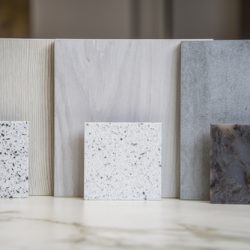 When it comes to remodeling your kitchen or bathroom, one of the most critical decisions you’ll face is choosing the right countertop material. Countertops play a significant role in both the aesthetics and functionality of a space, making the decision all the more important. There are a plethora of countertop materials available, each with its own unique set of advantages and disadvantages. In this blog post, we’ll explore some of the most popular countertop materials, helping you understand the pros and cons of each to make an informed decision for your home.
When it comes to remodeling your kitchen or bathroom, one of the most critical decisions you’ll face is choosing the right countertop material. Countertops play a significant role in both the aesthetics and functionality of a space, making the decision all the more important. There are a plethora of countertop materials available, each with its own unique set of advantages and disadvantages. In this blog post, we’ll explore some of the most popular countertop materials, helping you understand the pros and cons of each to make an informed decision for your home.
Granite Countertops
Pros:
Durability: Granite is known for its exceptional durability, making it resistant to scratches and heat. It can withstand the test of time and maintain its appearance.
Aesthetics: Granite offers a natural, elegant look with unique veining and color variations. It adds a touch of luxury to any kitchen or bathroom.
Low Maintenance: It requires minimal maintenance, usually only needing regular sealing to prevent staining.
Cons:
Cost: Granite can be one of the more expensive options. The quality and rarity of the stone can significantly affect the price.
Limited Color Choices: While granite offers a wide range of colors and patterns, it may not provide the exact color you desire.
Weight: Granite is exceptionally heavy, which may require additional support for cabinets.
Quartz Countertops
Pros:
Non-Porous: Quartz is non-porous, making it highly resistant to stains, bacteria, and moisture. This makes it an excellent choice for kitchens.
Variety of Colors: Quartz countertops come in a vast array of colors and patterns, giving you plenty of design options.
Low Maintenance: They require minimal maintenance, as they do not need to be sealed like natural stones.
Cons:
Price: While it can be more affordable than some high-end natural stones, quartz countertops are generally pricier than laminate or tile options.
Not Heat Resistant: Quartz countertops are not as heat resistant as some other materials, so hot pots and pans can potentially damage them.
Appearance: Some homeowners may prefer the natural beauty of stone over the engineered look of quartz.
Marble Countertops
Pros:
Elegance: Marble is renowned for its timeless beauty and elegant appearance. It can add a luxurious touch to any space.
Cool Surface: Marble naturally stays cooler than room temperature, making it ideal for baking and working with pastries.
Unique Patterns: Each marble slab is unique, offering a variety of veining and colors for a one-of-a-kind look.
Cons:
Porous: Marble is porous and can stain easily if not properly sealed and maintained.
Scratch and Etch Prone: It’s softer than some other stones, making it more susceptible to scratches and etching from acidic substances.
Cost: High-quality marble can be expensive, and the need for professional installation adds to the overall cost.
Solid Surface Countertops
Pros:
Seamless Design: Solid surface countertops can be fabricated without visible seams, creating a sleek and modern look.
Non-Porous: They are non-porous and resistant to stains and bacteria, making them a hygienic choice for kitchens.
Repairable: Any scratches or burns can often be sanded out, restoring the surface to its original condition.
Cons:
Susceptible to Heat: Solid surface countertops are not as heat resistant as some other materials, and hot pans can damage them.
Not as Durable: They are not as durable as natural stone or quartz, so they may require more frequent maintenance.
Limited Design Options: While solid surface countertops come in a variety of colors and patterns, they may not offer the same natural beauty as stone.
Laminate Countertops
Pros:
Affordability: Laminate countertops are one of the most budget-friendly options, making them a great choice for cost-conscious homeowners.
Versatility: They come in a wide range of colors and patterns, including designs that mimic the look of natural stone.
Easy Installation: Laminate countertops are relatively easy to install and replace, making them a DIY-friendly option.
Cons:
Durability: Laminate is not as durable as stone or solid surface options and can be prone to scratching and chipping.
Not Heat Resistant: Laminate countertops are not heat resistant, so hot pans can cause damage.
Moisture Susceptibility: Excess moisture can cause the material to swell or warp, so it’s not ideal for areas near sinks or dishwashers.
Tile Countertops
Pros:
Cost-Effective: Tile countertops are often more affordable than solid slabs of stone or quartz.
Design Versatility: Tiles offer numerous design possibilities, allowing you to create unique patterns and combinations.
Easy Repair: If a tile becomes damaged, it can be replaced individually without the need to redo the entire countertop.
Cons:
Grout Maintenance: Grout lines can be a breeding ground for bacteria and may require regular cleaning and sealing.
Uneven Surface: The surface of a tiled countertop can be uneven, making it less suitable for rolling out dough or other precision tasks.
Susceptibility to Chips and Cracks: Individual tiles can chip or crack, requiring replacements over time.
Conclusion
The choice of countertop material should be based on your specific needs, budget, and aesthetic preferences. Each material comes with its own set of advantages and disadvantages, and it’s essential to weigh these carefully before making a decision. Whether you prioritize the timeless beauty of marble, the durability of quartz, the affordability of laminate, or the versatility of tile, there is a countertop material that will suit your lifestyle and design vision. By understanding the pros and cons of different countertop materials, you can make an informed choice that will enhance the functionality and aesthetics of your kitchen or bathroom.